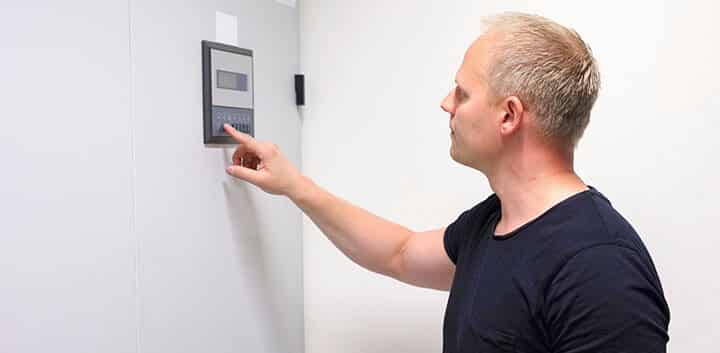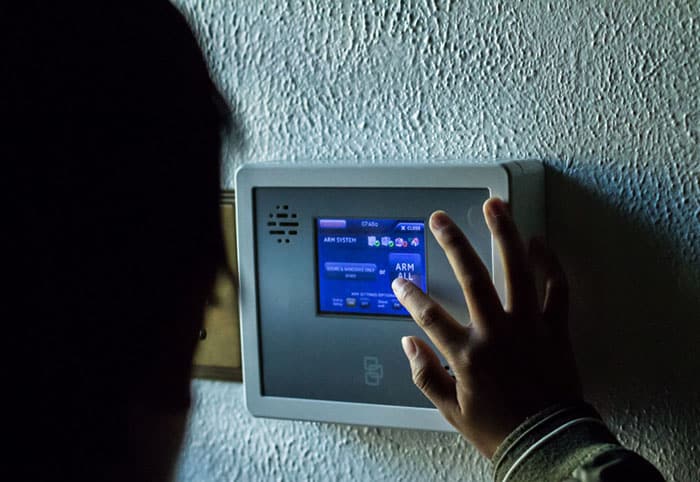It's crucial to learn how to perform security system maintenance because security systems require regular maintenance in order to provide your home with the protection it needs. So let's talk about this topic.

Perform a security system maintenance means inspecting the components carefully, replacing batteries when needed, and ensuring all the devices communicate well with each other.
While the control panel and a monitoring service will oversee all aspects of your security system, you should inspect your security system on a weekly basis for optimum performance.
Here’s our quick step-by-step guide on how to properly perform security system maintenance to keep your property safe and protected.
Conduct perimeter checks
Take a look around and inspect the condition of all the doors and window locks.
Are they latching on properly? Are there any signs of tampering on the locks themselves? If so, consider replacing the locks as soon as possible.
Check the structural integrity of the door and window frames to ensure these areas hold up even excessive force is applied.
Door and window sensors are usually held in place with an adhesive and are battery operated. Check if the adhesives are holding up.
You’ll notice that some sensors will need to be re-fastened for better adhesion. Also, check the condition of the batteries. Wireless sensors require the occasional charging and battery testing to keep them up and running.
Test out the control panel
The control panel is where all the action takes place and is commonly referred to as the “brain” of the security system.
This hub is responsible for communicating with all of the devices installed in your property, such as fire and smoke alarms, motion sensors, and door and window sensors. A signal passes through the control panel and triggers the alarm to notify you of a security breach.
Most modern control panels have a self-diagnostic test that checks the status of each device and notifies you if any issues are present.
Do note that if you’re using a monitoring service, you should inform your security systems provider before running a self-diagnostic test to prevent a false alarm response. If you discover any problems with your security system, contact a technician immediately to address it.
Aside from testing out the control panel, you should also inspect the exterior of the control panel. Make sure the wires aren’t loose and there are no signs of damage on the control panel itself.
Inspect the security cameras
Security cameras are an integral part of a security system. If they aren’t working properly, your home is more vulnerable to attacks and break-ins.
The first thing you should do is identify which type of security camera you are using. Security cameras today are either:
● Analog cameras
● IP cameras
Analog cameras usually rely on coaxial cables to transmit the analog signal to a Digital Video Recorder that converts it to digital before recording.
IP cameras generates digital signal and use UTP (Unshielded Twisted Pair) cables or Wi-Fi radios to transmit such a signal to Network Video Recorder.
Check the condition of the cables on your CCTV cameras. Ensure they’re connected properly and there is no visible wear or tear.
Most CCTV cameras malfunction due to improper cabling and installation (such as running the camera on a high power source or installing the camera on a metal building (which is basically one large conductor).
This can lead to ground loop and cause horizontal lines to appear on the camera monitor. If you are faced with this issue, it’s best to contact a licensed technician to help resolve the problem.
==> To learn more, read the article: How to fix the CCTV ground loop.
If your IP cameras are connected over WiFi, make sure the signal is strong enough so that it remains connected 24/7.
Some homeowners use a WiFi repeater to further amplify the signal and reduce the risk of disconnection problems. Also, check if there are no IP address conflicts and the wireless IP camera is powered on at all times.
Request for annual inspections
You can only go so far with conducting your own inspection until something serious starts malfunctioning.
That’s why requesting for an annual inspection is key to ensure that every component is functioning properly, from the cables right down to the devices.
Most security systems providers offer annual inspections for cheap, with some even offering it for free during the initial agreement.
Having a qualified technician inspect your security system can also help prevent costly repairs in the future.
The last thing you want is for your security system to malfunction when you need it the most, so make sure to contact your security system provider for a thorough inspection and it will also help you save money because security systems reduce home insurance premiums.
Performing security system maintenance can go a long way towards keeping your home safe and protected.
Keep in mind that while security systems are built to be reliable, your own diligence plays a factor on how well the components work.
If you have any concerns with your security system, call your security systems provider and have it addressed as soon as possible.
